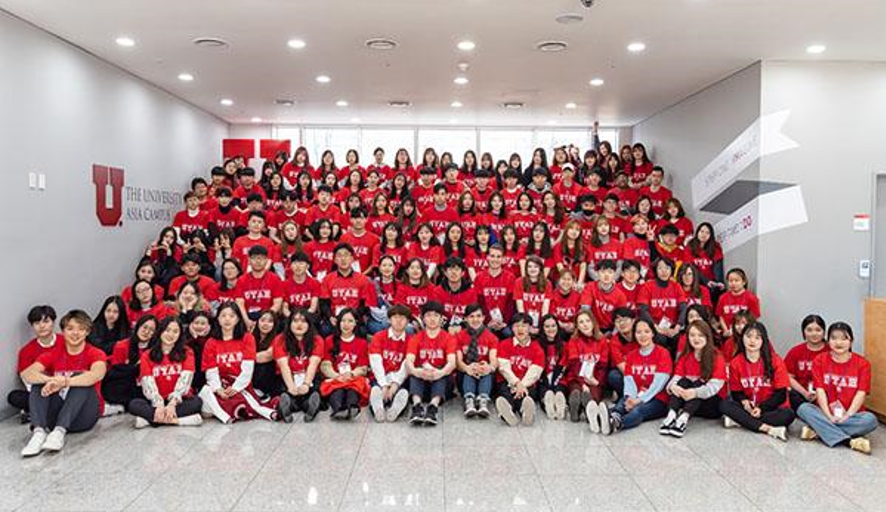UAC Domestic and International Students Struggles to Interact
New Student Orientation for the newly registered Spring 2019 students. This was the largest class of international students and largest class in general that has been welcomed to UAC since its inaugural in 2014. (Credit: Utah Asia Campus Official Website)
March 11, 2020
As the amount of international students and the general study body grows each semester, there are increased concerns regarding lack of interaction between domestic and international students. However, there has been improvement as the number of international students grows they feel less isolated among peers.
Scott Jo, a Korean student who has student studied abroad in the U.S, mentioned that the main reason there is a divide between students is that there are both cultural and language barriers that separate them.
“When I was in America, since I was the minority, most friends were foreigners. So, it was not awkward to make more friends. South Korea is primarily just Koreans through primary school so students are not used to studying with international students,” Scott added.
Learning Abroad student from the main campus, Tommy Nguyen, also agreed that there is a language barrier between students. He mentioned part of the problem comes from the fact that UAC is an English institution.
“Because the classes are taught in English, International Students are not required to learn a new language or anything. It is not completely jumping into unknown waters,” he said. As a result, there is a language barrier as students for the most part would prefer to interact in their native language.
Lack of interaction between international and domestic students is not only a UAC problem, but is something that occurs everywhere. Alison Tominaga previously worked with international student programming in America and worked to encourage interaction between international and domestic students.
She said, “Exchange students from China, Korea, or wherever it may be tend to stick together. It takes extra effort to break the ice. Culturally it is a lot different. It is obviously easier to stick with people who you relate with more. They realize this is problem and events that include both students will at least help encourage more interaction.”
Events are hosted in UAC like this in order to encourage interaction between students. However, interaction and friendships cannot be forced.
“It is a mindset thing. It is making an effort. If they can realize they have more in common regardless of race or a language barrier they can become friends. It is up to the individual,” she also added.
Hayeon Kim, a UAC domestic student, also commented from her perspective as to why many Korean domestic students struggle to interact with international students. She said in Korea, most students begin learning English formally and for the most part only learn in the classroom. However, later they find speaking to be very difficult and they may become reluctant to speak it.
She also stated that “in general, events organized by schools are often attended by Korean students who have already had active exchanges with foreigners. Korean students who do not interact well with foreigners do not participate in such activities.”
UAC Dean of Students Randy McCrillis is also aware of this problem and says the school is making efforts to encourage interaction between students. This has been done previously with the international buddy program where international students, if they would like, can be paired with a Korean that can assist them during their first semester at UAC.
However, difficulties have been mentioned by international students in the program. An international student who chose to remain unnamed commented that “some students don’t even speak often to their buddy. Maybe once or twice. It can seem even awkward. I think it is more helpful to be friends with someone who is Korean and you can actually become good friends with.”
Dr. McCrillis also mentioned other events and efforts to integrate students and also attract more students outside of Korea in countries such as China or in the U.S. One example is advertising at KCON in California. There is also the referral program where a student can receive $1,000 that can go towards tuition if they convince an individual into enrolling in UAC.
Next semester, UAC will also be hosting its first International Education Week where students from different backgrounds can exchange different aspects of their culture and share it with the community.
Dr. McCrillis lastly mentioned the benefits of attending the UAC, international or domestic, where students can learn leadership skills, critical thinking, analytical and synthesis skills, and an education that imburses students in English which is the predominant language of business and commerce. Students also can gain global and environment experience, and a place where students can appreciate those from other cultures.

